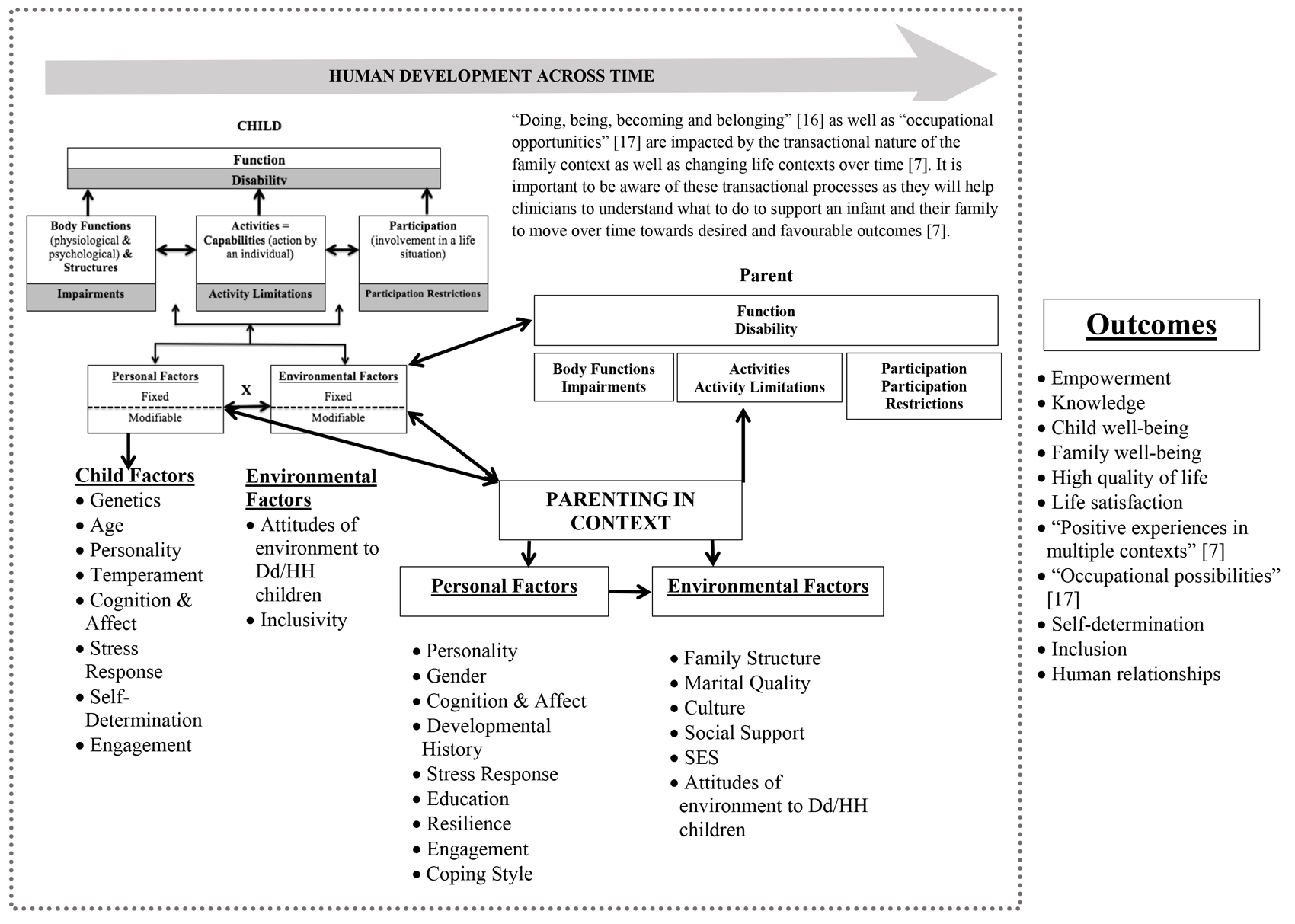Family-centred care for young children is a commonly used but frequently under-appreciated approach in audiology. Prof Moodie discusses how we can take positive action to improve our approach to families in ways that make a meaningful difference in their lives.
In 2013, Moeller and colleagues published an international consensus statement describing best practices in family-centred early intervention (FCEI) for children who are D/deaf or hard of hearing (Dd/HH) [1]. In the conclusion of their article they encouraged colleagues to “take action” to promote awareness and implementation of the 10 principles guiding FCEI.
The objective of this article is to support the call-to-action [1] by providing some reflections from this author on the context for early hearing detection and intervention programmes (EHDI), namely the child-parent-family context.
To start, in order to design and deliver effective support and intervention(s) for a child who is Dd/HH and their family, we must understand more than the impairment, activity limitations and participation restrictions of the child [2]; we must understand the child’s everyday life situations [3] and context of their everyday listening situation(s) [4-9]. The advantage of taking this perspective is that it views body functions, activity capabilities and participation as transactional, multidimensional and dynamic constructs that are intimately interconnected in a nonlinear way; affected by contexts and relationships that impact child wellbeing, development and family outcomes [4-9]. It emphasises that “the whole (i.e. the outcome of interest) is much more than sum of the influential parts; the interaction among these multiple contributing factors is critical in shaping the outcome” [8,p.170,9].
“We must understand more than the impairment, activity limitations and participation restrictions of the child; we must understand the child’s everyday life situations and context of their everyday listening situation(s).”
In order to provide best practices in family-centred intervention we must consider the child in context, the parent in context, the interaction of child-parent and context keeping in mind that human development occurs over time and we aim to achieve desirable and favourable outcomes from our intervention(s). In other words “context is a concept that integrates the totality of circumstances that comprise the milieu of human life and human functioning” [4,p.110,10].

Figure 1: A framework for considering context within FCEI and EHDI programme.
Figure 1 provides a visual representation of a framework for considering context within EHDI programmes and builds on the author’s earlier work [11]. The remainder of this article will provide a brief discussion of the contextual components included in Figure 1.
Overall considerations of context
Despite the importance of context in the life of a young child with a disability, there is insufficient specificity in its definition and description on how it should be considered in the International Classification of Functioning, Disability, and Health – Child & Youth Version (ICF-CY) [2]. We do know that a child’s personal and environmental contexts are “essential pillars of a social-ecological understanding of disability” [10, p.287] and are an important consideration in parent and child support paradigms [4-11].
Child-related personal and environmental factors that influence the FCEI context
It is important to remember that there are fixed/independent and modifiable/intervening variables related to child-related personal and environmental factors that influence the overall family context [8-11]. Fixed or independent variables must be studied and understood relative to the context in order to design and deliver effective supports [8,10,11]. These include factors such as age, gender, ethnicity, family culture, and genetics. Intervening or modifiable variables include those factors that can be manipulated/changed to enhance activity, participation and functioning. Intervening variables include attitudes of the community about people who are Dd/HH, societal practices and policy around inclusivity, etc. [8,10,11]. Figure 1 lists some examples of child personal and environmental factors that will impact the transactional process of FCEI. It is also important to understand and study the impact of these personal and environmental factors in terms of parenting in the context of raising a child who is Dd/HH.
Parenting in context of raising a child who is Dd/HH
In EHDI programmes, families constitute the most influential context, especially in the early years [12,13]. This underscores the importance of parents as collaborative partners in systems of care for children with hearing loss. Among the variables involved in parent-related context(s) that need to be considered within EHDI programmes are: (1) personal factors such as developmental history, coping style, resilience; and (2) environmental factors such as family structure, social support, socioeconomic status (SES), family knowledge about child development, and attitude related to hearing loss. Figure 1 provides a list of parent contextual personal and environmental factors that will impact the transactional process of FCEI. The list is not meant to be exhaustive.
The importance of understanding context in the development of intervention and outcomes
As part of continued family-centred early intervention research and development, a further call for action could be to ensure the promotion of family and system contexts that facilitate human functioning while focusing on valued outcomes [10]. A conceptual framework of parent-to-parent support for parents of children who are
Dd/HH has been developed and defines the constructs, components and anticipated outcomes of contextually-based support [14,15]. This parent-to-parent framework indicates that some of the anticipated outcomes from using a contextual-referenced framework for FCEI include empowerment, knowledge and wellbeing (both child and family). As shown in Figure 1, other valued outcomes of contextually-based FCEI include: high quality of life, life satisfaction, positive experiences in multiple contexts, education possibilities, occupational possibilities, inclusion and human relationship(s).
“Fixed or independent variables must be studied and understood relative to the context in order to design and deliver effective supports.”
Conclusion
The aim of this article is to promote an understanding and offer additional insight on best practices in FCEI by providing a discussion focusing on the importance of understanding context within family-centred EHDI programmes. Doing, being, becoming and belonging [16] as well as “occupational opportunities” [17] are impacted by the transactional nature of the family context, as well as changing life contexts over time [7,11]. It is important to be aware of these transactional processes and to use systematic processes to define and work within context as this will help clinicians, organisations and policy-makers to understand what to do to support a child and their family over time to achieve desirable and favourable outcomes.
References
1. Moeller MP, Carr G, Seaver L, et al. Best practices in family-centred early intervention for children who are deaf or hard of hearing: An international consensus statement. Journal of Deaf Studies and Deaf Education 2013;18(4):429-45.
2. World Health Organization. (2007). International classification of functioning, disability and health: children and youth version: ICF-CY. World Health Organization.
www.who.int/iris/handle/10665/43737
Last accessed September 2018.
3. Adolfsson M, Malmqvist J, Pless M, Granuld M. Identifying child functioning from an ICF-CY perspective: Everyday life situations explored in measures of participation. Disability & Rehabilitation 2011;33(13-14):1230-44.
4. Shogren KA, Luckasson R, Schalock RL. The definition of “context” and its application in the field of intellectual disability. Journal of Policy and Practice in Intellectual Disabilities 2014;11(2):109-19.
5. Taraban L, Shaw, DS. Parenting in context: Revisiting Belsky’s classic process of parenting model in early childhood. Developmental Review 2018;48:55-81.
6. Shogren KA, Luckasson R, Schalock RL. Using context as an integrative framework to align policy: Goals, supports, and outcomes in intellectual disability. Intellectual and Developmental Disabilities 2015;53(5):367-76.
7. King G, Imms C, Stewart D, et al. A transactional framework for pediatric rehabilitation: shifting the focus to situated contexts, transactional processes, and adaptive developmental outcomes. Disability and Rehabilitation 2018;40(15):1829-41.
8. Bartlett DJ, Macnab J, Macarthur C, et al. Advancing rehabilitation research: An interactionist perspective to guide question and design. Disability and Rehabilitation 2006;28(19):1169-76.
9. McDougall J, Wright V, Rosenbaum P. The ICF model of functioning and disability: incorporating quality of life and human development. Developmental Neurorehabilitation 2010;13(3):204–211.
10. Shogren KA, Luckasson R, Schalock RL. The responsibility to build contexts that enhance human functioning and promote valued outcomes for people with intellectual disability: Strengthening system responsiveness. Intellectual and Developmental Disabilities 2018;56(4):287-300.
11. Bagatto MP, Moodie ST. The ICF-CY in EHDI programs. Seminars in Hearing 2016;37(3):257-71.
12. Bronfenbrenner U. The bioecological model from a life course perspective: Reflections of a participant observer. In: Moen GH, Elder Jr, Lüscher K (Eds.), Examining Lives in Context: Perspectives on the Ecology of Human Development. Washington DC, USA; American Psychological Association; 1995.
13. Lippman LH, Moore KA, McIntosh H. Positive indicators of child well-being: A conceptual framework, measures, and methodological issues. Applied Research in Quality of Life 2011;6(4):425-49.
14. Henderson R, Johnson A, Moodie ST. Revised conceptual framework of parent-to-parent support for parents of children who are Deaf or Hard of Hearing: A modified Delphi study. American Journal of Audiology 2016;25(2):110-26.
15. Henderson R, Johnson A, Moodie ST. Parent-to-parent support for parents with children who are deaf or hard of hearing: A conceptual framework. American Journal of Audiology 2014;23(4):437-48.
16. Wilcock AA, Hocking C. An Occupational Perspective of Health (3rd ed). Thorofare NJ, USA; Slack Incorporated;2015.
17. Laliberte Rudman D. Debbie Laliberte Rudman (2010) Occupational terminology: Occupational possibilities. Journal of Occupational Science 2010;17(1):55-9.
Declaration of Competing Interests: None declared.





